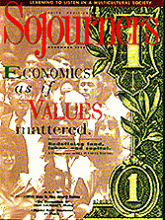The Constitution, not unlike the Bible, draws radically different schools of interpretation. When the Supreme Court begins a session with a new member--as happened October 4 with Ruth Bader Ginsburg--the question from all quadrants is which interpretive method will she bring to the mix. How will the discernment of rights and responsibilities in our society be affected?
Judicial conservatives (such as Antonin Scalia or former Supreme Court nominee Robert Bork) claim to interpret the Constitution literally, based on the "original intention" of its framers, excluding constitutional protection for individual rights beyond those that are expressly mentioned in the document or those that have been traditional in the dominant society.
Another approach sees new rights emerging as society changes. For example, the 14th Amendment's guarantee of "equal protection of the law" is seen as a mandate that extends beyond its original intent (granting full rights to African Americans) to cover others also. So while the 14th Amendment was not intended to guarantee equal rights for women, it is seen by many as justification to do so. Critics of this approach assert that it places the court in the position of legislating, not judging; it is "judicial activism," not so-called "neutral" discernment.
Ginsburg's career and personal ideology have embraced a more expansive view of constitutional rights. She was a volunteer attorney for the American Civil Liberties Union Women's Rights Project in the 1970s, litigating several cases before the Supreme Court that succeeded in challenging many gender-based laws.
Read the Full Article

